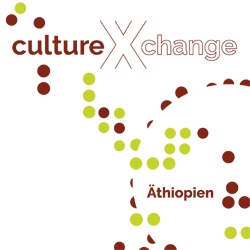Culture X Change fulfils the role of art and music as a starting point for non-European artistic cooperation. The project serves as a door opener and transmission belt to question existing stereotypes about the „Other“. The contributions take a critical look at, among other, the freedom of art and the cultural creators in the respective countries. In addition to concerts, other art forms such as film, literature, theatre or fine art will be included in the programme in the future.
What do we think of, when we hear about Ethiopia?
Haile Selassie, Addis Abeba, Lalibela, Rastafari, and the Queen of Saba?, of Haile Gebrselassie, the marathon world record holder, coffee ceremonies ... Second thought: drought, „Menschen für Menschen“, hunger aid, civil war, dictatorship... . Moreover? Art and Culture. Ethiopian music, Ethiopian Jazz, Ethio-Jazz, has been a term among experts since the end of the 60s. Ada Mulaneh is a well known photographer across the borders of Ethiopia and founder of Addis Foto Fest. Her works were exhibited last year over dimensionally at the photo festival in Baden. Furthermore, the Austrian development aid has engaged in Ethiopia for decades and has supported many projects. In the past kulturen in bewegung organized stunning concerts with an Azmari ensemble and the Krar Collective. In light of the political and social developments in the region, we think that it´s to pay more attention to this East African country. Existing relationships shall be picked up and new contact made.
Culture X Change #Ethiopia is a drop. But a continuous drop leads to movement, flow and communication between humans and cultures. No more and no less do we want to achieve with this program.
#Music
27. October 2019
8.30pm, Porgy & Bess
Samuel Yirga is a young representative of the Ethiojazz-Scene. How do the representatives of the group chuffDRONE react to his musical ideas?
Lisa Hofmaninger (Sopransaxofon, Bassklarinette), Judith Ferstl (Kontrabass) und Judith Schwarz (Schlagzeug) Jul Dillier (Klavier) und Robert Schröck (Altsaxophon, Baritonsaxophon, Klarinette)
#Art
31. October 2019, 7pm – 16. November 2019
hinterland Galerie
Artists*: Mihiret Kebede, Negede Gezahegn Geremeskel aka Faris Cuchi, Helen Zeru, Berhanu Ashagrie Deribew
Martha’s photo exhibition tries to challenge the stereotype about people in rural Ethiopia while celebrating their everyday life. It shows that human beings are all connected through hope, love and resilience just in different social, economic and political situations. It is the photographer’s hope that audience finds the connection one way or another.
Curators*: Mihret Kebedi, Negede Gezahegn Geremeskel aka Faris Cuchi, Marissa Lobo
#Workshop
25. Oktober 2019, 3pm
Akademie für Bildende Kunst Wien
Cultural aktivist Surafel Wondimu offers a day workshop for PHD students at the Academy of Fine Arts Vienna. Furthermore, he is going to participate in a Global Dialogue discussion about new democratic movements in Africa. Afterwards, Mihret Kibede invites everyone to Fantastic Wednesday "Conversing with Silence", with Surafel Wondimu as a friendly critics, 6pm.
#Dialog/Get Together&Community
24. October 2019, 7pm
Haus der Begegnung Mariahilf
African uprising. Social movements in Sudan and Ethiopia
Despite the differences of causes and contexts of the protests in Sudan and Ethiopia, there are similarities: youth, women and diaspora play an important role. The representation and use of social media and arts shape the expression of protests. In this context, the panel discussion focuses on the following questions: What are the particular reasons to protest in Sudan and Ethiopia? Who were the main actors of the protests and what role do youth and particularly young women play? How was and is the diaspora involved in the protests? How do social movements mobilize in shrinking democratic spaces and to what extent are protests able to democratize spaces and societies? Which transnational relations do the respective protest movements and grassroot organisations have? What are the regional implications of the protests?
Nagda Mansour Adam, translator, human rights advocate and activist from Khartoum
Surafel Wondimu, theatre scientist, play writer, media producer, activist, Addis Abeba
Faisal Mohamed Saleh, human rights defender, journalist
Moderation: Antje Daniel, Professor at the University of Vienna, Development Studies; research focus: development research, social movements, political participation, feminist theories
#Community
20. Oktober – 01. November 2019
Coffee Pirates
Kafa in Vienna - The Art of Coffee/Get Together
Ethiopia or, more precisely, the region Kafa is the area of origin of red beans. This fact is also the background of this transcultural get together that we gratefully can organize at one of the most popular younger cafes in the city.
Evelyn Priesch, manager of Coffee Pirates at Spitalgasse, made a room available for 13 days, in which Emuyi (Zuriyashwerk Abegaz) operator of a small ethiopian cafe in Addis Abeba and her assistant Tsion Molla are going to celebrate the art and culture of ethiopian coffee making. How does pure coffee form Ethiopia taste? From where do the beans originate? How long do you have to roast them? What does coffee mean to people in Ethiopia? How does climate change affect the coffee production? Which type of preparation? Questions over questions that are asked in context of “Kafa in Vienna”. Not least, Vienna defines itself by its coffee culture, from small black coffee to a Melange and all the stories about and around the coffee houses as social institutions and meeting points.
Thus, in regard to this Ethiopian art of coffee ceremony a culinary-artistic-cross-culture get together with the Ethiopian diaspora in Vienna is going to take place.
Works of the photographer Martha Tadesse about the situation of coffee making in Ethiopia or rather the role of coffee bars and –houses in Ethiopia round off this initiative.
Culture X Change erfüllt die Rolle der Kunst und der Musik als Startpiste für außereuropäische künstlerische Kooperationen. Kultur ist Türöffner und Transmissionsriemen, bestehende Stereotype des „Anderen“ in Frage zu stellen..
Woran denken wir, wenn wir Äthiopien hören?
Haile Selassie, Addis Abeba, Lalibela, Rastafari, an die Königin von Saba?, an Haile Gebrselassie, den Marathon-Weltrekordler, Kaffeezeremonie... . Zweiter Gedanke: Dürre, Menschen für Menschen, Hungerhilfe, Bürgerkrieg, Diktatur... .Darüber hinaus? Kunst und Kultur. Äthiopische Musik, äthiopischer Jazz, Ethio-Jazz, war schon Ende 60er Jahre in Fachkreisen ein Begriff. Darüber hinaus engagiert sich die österreichische Entwicklungszusammenarbeit jahrzehntelang in Äthiopien und fördert zahlreiche Projekte. Und in jüngster Zeit: Ein liberaler Reformer namens Abiy Ahmed als neuer Premierminister, die Freilassung politischer Gefangener, Aufnahme von knapp einer Million Flüchtlinge, ethnische Spannungen in den Regionen, eine Friedensvereinbarung.
Culture X Change #Äthiopien ist ein Tropfen. Doch steter Tropfen bringt Bewegung, Fluss und Verständigung zwischen Menschen und Kulturen. Nicht mehr und nicht weniger möchten wir mit den Programmangeboten erreichen.
Musik
27. Oktober 2019
20:30, Porgy & Bess
Samuel Yirga ist ein junger Vertreter der Ethiojazz-Szene. Wie reagieren VertreterInnen der Gruppe chuffDRONE auf seine musikalischen Ideen?
Lisa Hofmaninger (Sopransaxofon, Bassklarinette), Judith Ferstl (Kontrabass) und Judith Schwarz (Schlagzeug) Jul Dillier (Klavier) und Robert Schröck (Altsaxophon, Baritonsaxophon, Klarinette)
Kunst
31. Oktober 2019, 19:00 – 16. November 2019
Galerie Hinterland
Künstler*innen: Mihiret Kebede, Negede Gezahegn Geremeskel aka Faris Cuchi, Helen Zeru, Berhanu Ashagrie Deribew
Martha’s photo exhibition tries to challenge the stereotype about people in rural Ethiopia while celebrating their everyday life. It shows that human beings are all connected through hope, love and resilience just in different social, economic and political situations. It is the photographer’s hope that audience finds the connection one way or another.
Kurator*innen: Mihret Kebedi, Negede Gezahegn Geremeskel aka Faris Cuchi, Marissa Lobo
Workshop
25. Oktober 2019
Akademie für Bildende Kunst Wien
Kulturaktivist Surafel Wondimu gibt einen Tagesworkshop für PHD-Studierende am der Akademie der Bildenden Künste. Darüber hinaus nimmt er an einem Global Dialog-Diskussionsforum zu Fragen der neuen Demokratiebewegung in Afrika teil.
Dialog/Get Together&Community
24. Oktober 2019, 19:00
Haus der Begegnung Mariahilf
Aufbruch in Afrika. Soziale Bewegungen in Sudan und Äthiopien
Beide Nachbarländer wurden autoritär regiert. Welche Faktoren haben geholfen, die Angst vor den allgegenwärtigen Sicherheitskräften zu überwinden und die Massen zu mobilisieren? Welche transnationalen Beziehungen haben die jeweiligen Protestbewegungen? Welche Rolle spielten und spielen die Diaspora Netzwerke? Welche Auswirkungen haben die Proteste auf andere Langzeitherrscher in Afrika?
Nagda Mansour Adam, translator, human rights advocate and activist from Khartoum
Surafel Wondimu, theatre scientist, play writer, media producer, activist, Addis Abeba
Faisal Mohamed Saleh, human rights defender, journalist
Moderation: Antje Daniel, Professor at the University of Vienna, Development Studies; research focus: development research, social movements, political participation, feminist theories
Community
20. Oktober – 01. November 2019
Coffee Pirates
Kafa in Vienna - The Art of Coffee/Get Together
Äthiopien, genauer gesagt, die Region Kafa ist das Ursprungsgebiet der roten Bohne. Diese Tatsache ist auch der Hintergrund für ein interkulturelles Get Together, das wir dankenswerterweise in einem der „angesagtesten“ jüngeren Cafés der Stadt durchführen können. Evelyn Priesch, Geschäftsführerin der Coffee Pirates in der Spitalgasse, stellt für 14 Tage einen Raum bereit, in dem die Betreiberin eines kleinen äthiopischen Cafés in Addis Abeba mit ihrer Assistentin die Kunst und Kultur der äthiopischen Kaffeezubereitung zelebriert.
Wie schmeckt der pure Kaffee in Äthiopien? Woher kommen die Bohnen? Wie lange muss geröstet werden? Was bedeutet Kaffee für die Menschen in Äthiopien? Wie wird Kaffee angebaut? Wie wirkt sich der Klimawandel auf die Kaffeeproduktion aus? Welche Art der Zubereitung? Fragen über Fragen, die sich im Rahmen von „Kafa in Vienna“ stellen. Nicht zuletzt definiert sich Wien über seine Kaffekultur, vom kleinen Schwarzen bis zur Melange und all den Geschichten, die sich über und um die Kaffeehäuser als soziale Institutionen und Treffpunkte ranken.
So wird rund um die äthiopische Art der Kaffeezeremonie gemeinsam mit der äthiopischen Diaspora in Wien ein kulinarisch-künstlerisches-kulturübergreifendes Get-Together stattfinden.
Fotoarbeiten der Fotografin Martha Tadesse über die Situation der Kaffeezubereitung in Äthiopien bzw. auch der Funktion von Kaffeebars und – häusern in Äthiopien runden die Initiative ab.


